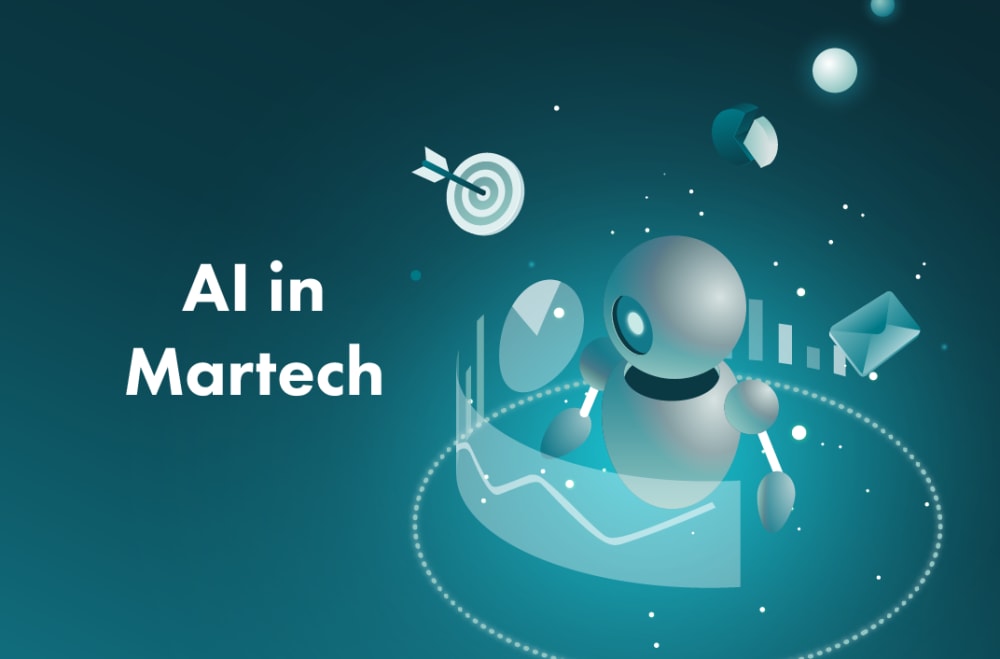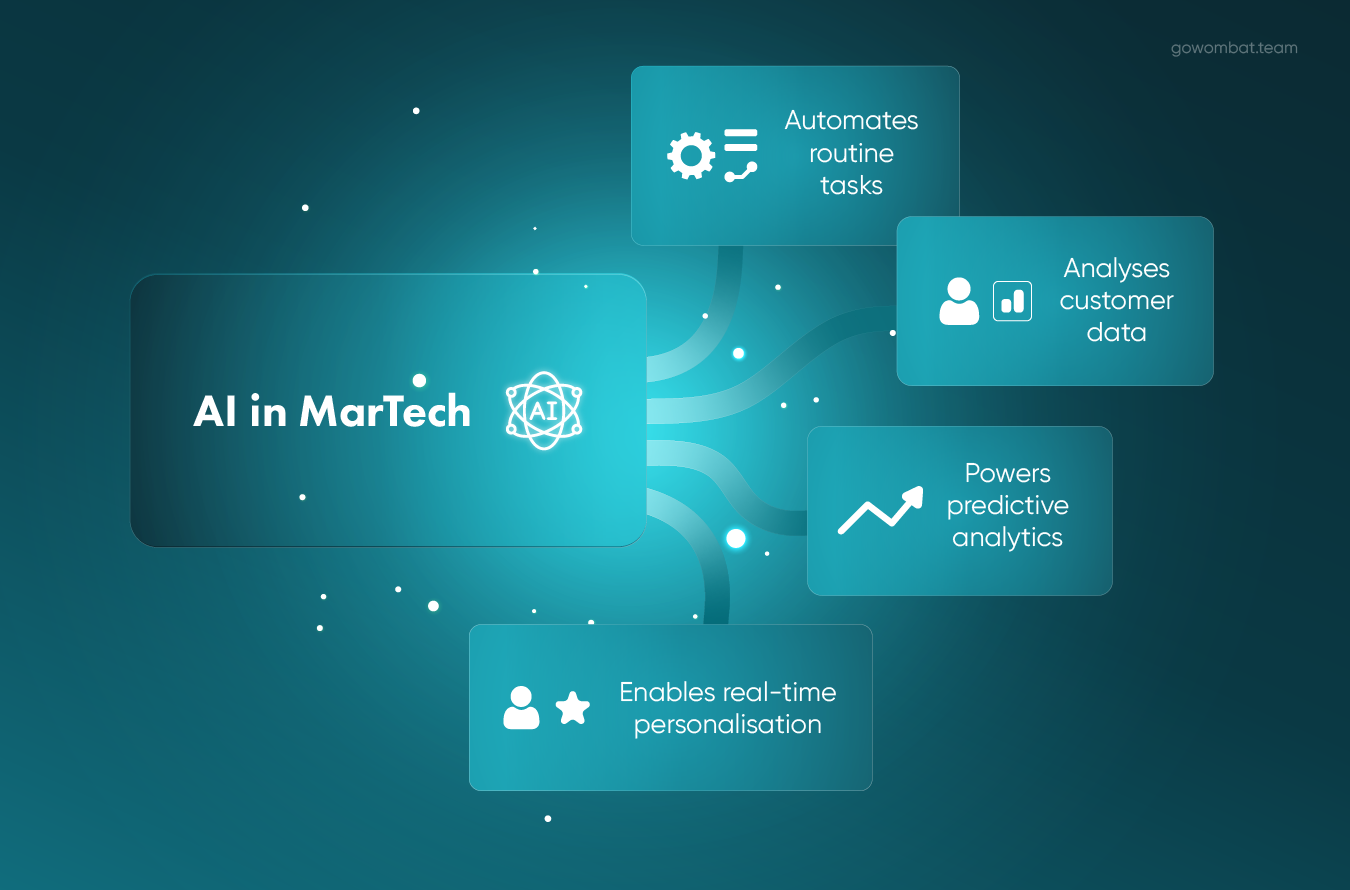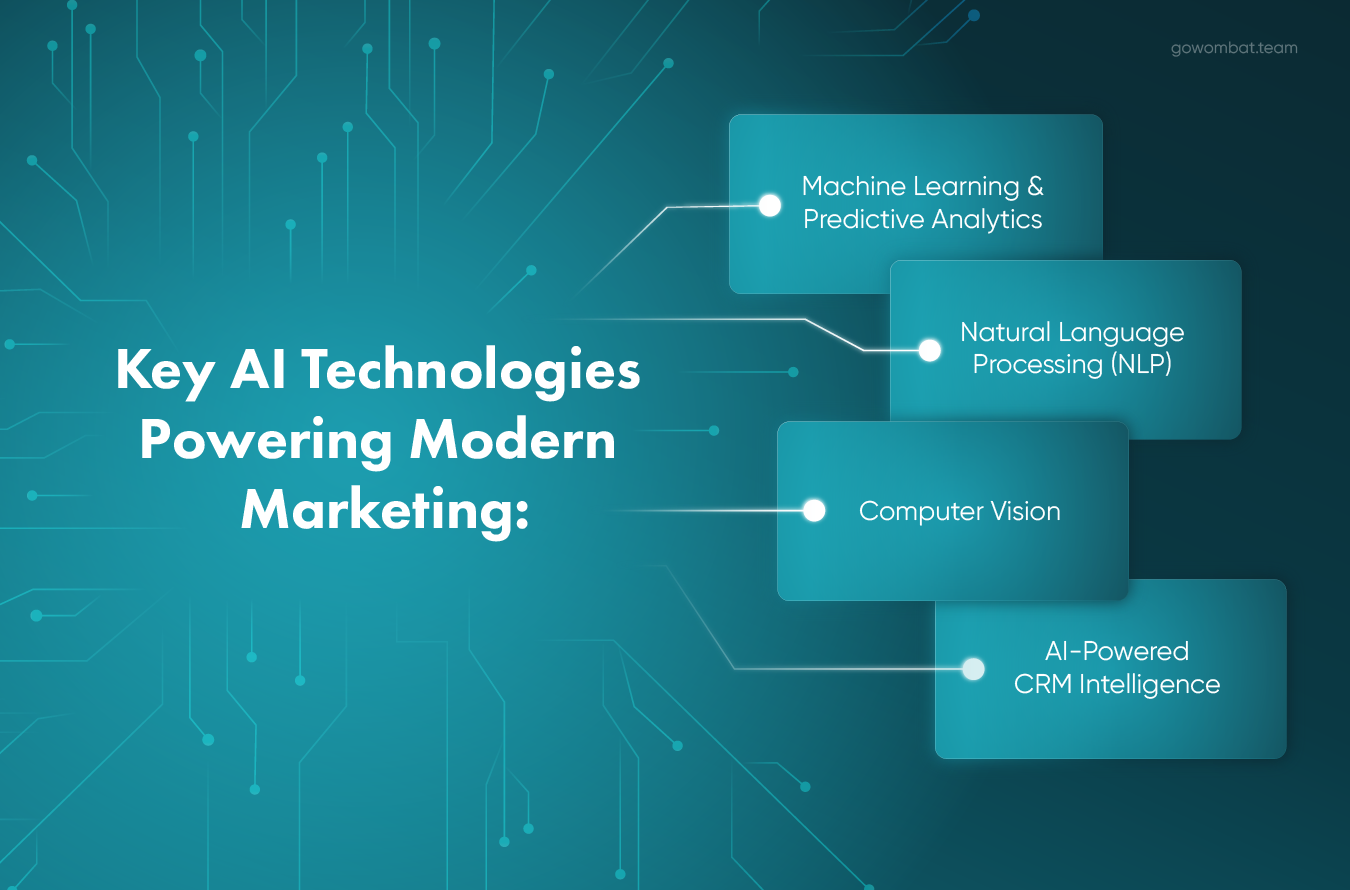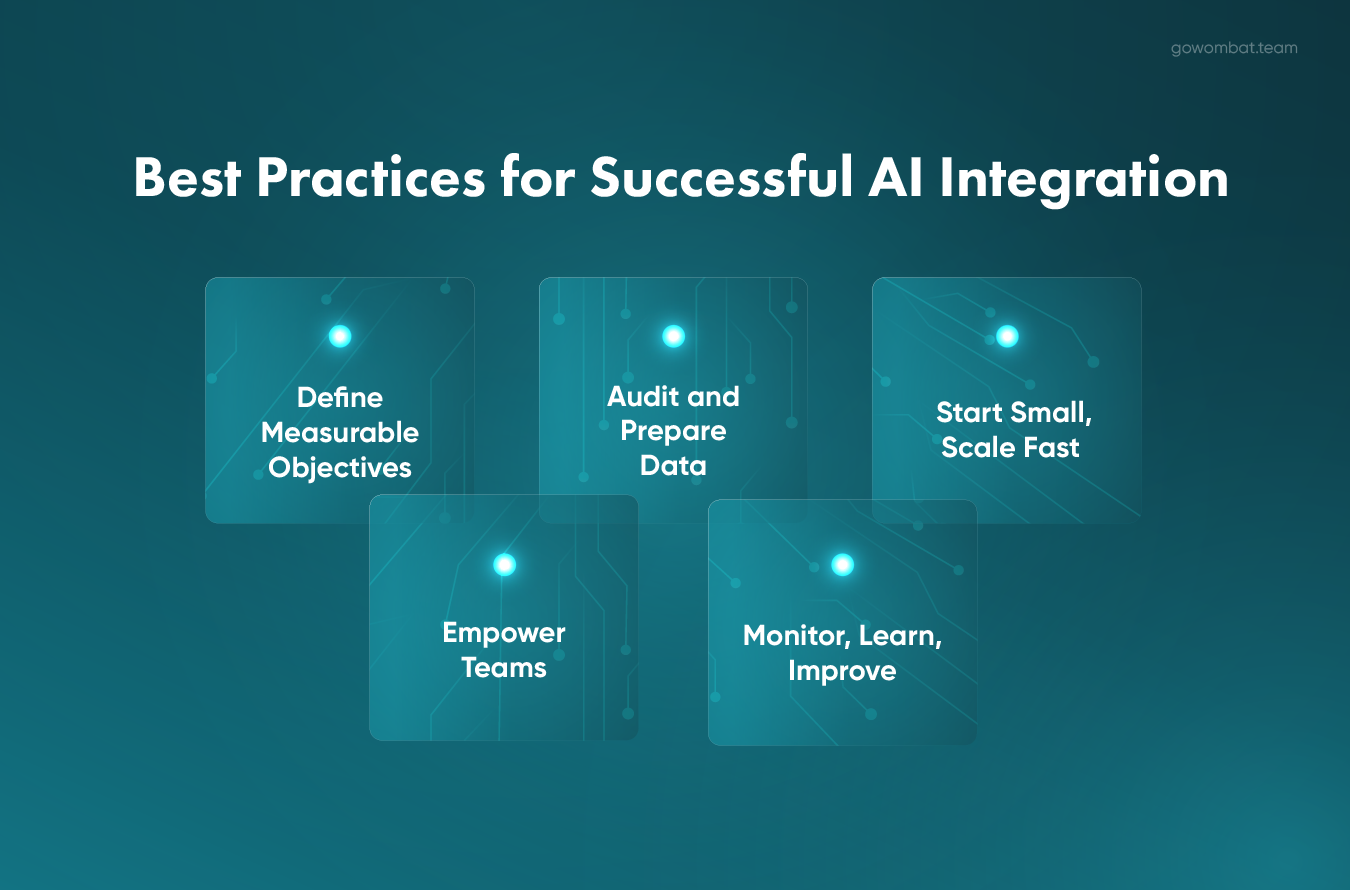AI in MarTech: A New Era of Intelligent Marketing Solutions


Introduction
Artificial intelligence (AI) has shifted from being a futuristic concept to becoming a core enabler of marketing success. Nearly 90% of marketers now use AI to automate workflows, analyse large-scale data, and personalise customer journeys. With the global MarTech market projected to surpass $500 billion by 2028 (Statista), AI is emerging as the cornerstone of next-generation marketing strategies.
But what lies beyond the headlines? How exactly are AI-powered tools reshaping MarTech? In this article, we unpack the transformative role of AI in marketing, the key technologies fuelling the shift, the benefits and challenges of implementation, and how Go Wombat supports decision-makers in building tailored, intelligent marketing software.
If you're ready to upgrade your marketing tech or launch a custom AI-powered solution, now’s the time to explore what’s possible. Whether you're a business owner or decision-maker looking to invest in smarter tools, this guide will show you what can happen when AI and MarTech come together.
The Strategic Role of AI in MarTech
AI is fundamentally altering how marketing teams operate—automating processes, surfacing insights, and delivering personalisation at scale. In practical terms, AI:
- Automates routine tasks like campaign scheduling, social media posting, and customer support.
- Analyses customer data to uncover behavioural trends and optimise targeting.
- Powers predictive analytics, enabling proactive decision-making.
- Enables real-time personalisation across digital touchpoints.

Real-World Example
Amazon’s recommendation engine—responsible for around 35% of the company’s revenue—uses AI to suggest relevant products based on user behaviour. It’s a textbook case of AI-driven personalisation driving both engagement and revenue.
Meanwhile, brands like Starbucks use AI platforms (e.g. Deep Brew) to personalise offers based on loyalty data, increasing average transaction value and customer retention.
Key AI Technologies Powering Modern Marketing
Artificial intelligence isn’t a single tool, it’s a stack of interrelated technologies, each playing a unique role in how marketing evolves. Understanding these components is essential for people planning to integrate AI into their MarTech infrastructure. Here are some foundational AI technologies reshaping marketing software today:

1. Machine Learning & Predictive Analytics
Machine learning (ML) is the engine behind AI’s predictive power. By learning from historical data, ML models help you move from reactive to proactive decision-making. With predictive analytics, your software can answer questions like:
- Which leads are most likely to convert?
- What’s the expected lifetime value of a new customer?
- Which channel will deliver the best ROI next quarter?
ML doesn’t just analyse past behaviour, it continually refines its predictions as new data comes in. From lead scoring and churn prediction to budget optimisation and personalised campaign timing, ML is the decision-making brain that helps marketers focus on what works, before competitors even spot the trend.
2. Natural Language Processing (NLP)
Natural Language Processing enables machines to understand, interpret, and generate human language—opening the door to more natural, scalable interactions between brands and their audiences.
Key applications in MarTech include:
- Conversational AI: Chatbots and virtual assistants handle FAQs, qualify leads, and support onboarding all in real-time, 24/7.
- AI-generated content: Tools powered by models like GPT-4 can create marketing copy, emails, social posts, and product descriptions at scale.
- Sentiment analysis: NLP can monitor reviews and social mentions to detect shifts in customer perception and brand sentiment.
By integrating NLP into your platform, you unlock smarter customer communication and faster, more responsive marketing.
3. Computer Vision
In a visual-first digital landscape, Computer vision (CV) gives your software the ability to interpret and understand visual content (images and videos). CV has become highly relevant in marketing with the explosion of visual platforms (Instagram, TikTok, etc.) and image-driven e-commerce.
Modern marketing teams use CV for:
- Visual search: Customers upload images to find similar products instantly.
- Augmented reality (AR): AI powers try-ons for cosmetics, fashion, and home décor.
- Brand visibility tracking: Detects your logo across user-generated content or influencer posts.
Behind the scenes, CV also streamlines internal workflows—automatically tagging, categorising, and managing massive libraries of creative assets. For any business operating in visual platforms or eCommerce, CV isn't just a nice-to-have but a competitive edge.
4. AI-Powered CRM Intelligence
Customer Relationship Management (CRM) platforms are evolving into intelligent, adaptive systems thanks to AI. Rather than just logging customer interactions, AI-enhanced CRMs analyse behavioural data to surface recommendations and automate actions.
Capabilities include:
- Dynamic lead scoring based on real-time signals.
- Trigger-based campaign suggestions tailored to each contact’s journey.
- Personalised content and product recommendations delivered automatically across channels.
Some AI CRMs even support agents with real-time response suggestions or auto-route support tickets to the right team using NLP. The result? A system that not only tracks your customer relationships but actively strengthens them.
Benefits of Adopting AI in Marketing Technology
1. Personalisation at Scale
AI enables 1:1 marketing experiences without increasing team size. It tailors offers, content, and timing based on individual behaviour and context.
71% of consumers expect personalised interactions, and 76% get frustrated when they don’t receive them (McKinsey).
2. Operational Efficiency
AI streamlines campaign execution—automating:
- A/B testing
- Budget allocation
- Customer segmentation
- Reporting and analytics
This frees up marketing leaders to focus on creative strategy and innovation.
3. Enhanced Decision-Making
AI provides actionable insights that help teams:
- Optimise customer journeys
- Refine ad targeting
- Identify high-value audiences and channels
Instead of guesswork, strategy is informed by real-time, data-backed decisions.
4. Superior Customer Experience
From AI chatbots to personalised content delivery, AI enhances every touchpoint. It:
- Reduces response times
- Anticipates customer needs
- Supports consistent brand interactions across platforms
Challenges and Considerations
1. Ethics, Privacy, and Compliance
AI must be deployed responsibly. Businesses need to:
- Comply with GDPR, CCPA, and other privacy laws
- Avoid algorithmic bias
- Ensure transparency in AI-driven decisions
2. Implementation Barriers
Adopting AI often requires:
- Integration with legacy systems
- Data quality improvements
- Upskilling teams or hiring AI specialists
- Change management support to overcome resistance
3. Cost and ROI Clarity
AI adoption can be costly upfront. It's essential to:
- Start with focused pilot projects
- Define clear success metrics
- Continuously track ROI to justify scaling
Best Practices for Successful AI Integration
- Define Measurable Objectives – Prioritise high-impact use cases (e.g. churn reduction, lead scoring).
- Audit and Prepare Data – Centralise and clean datasets to ensure AI models work effectively.
- Start Small, Scale Fast – Begin with proof-of-concepts before enterprise-wide deployment.
- Empower Teams – Train your team to use AI tools effectively and interpret their outputs.
- Monitor, Learn, Improve – Maintain a feedback loop for model performance and business impact.

Go Wombat’s Approach to AI-Driven Marketing Solutions
At Go Wombat, we help people in MarTech design and implement bespoke AI solutions that align with their tech stack, customer goals, and growth strategy. Our expertise spans:
- AI consulting to uncover relevant use cases.
- Custom model development using industry-leading frameworks (e.g. TensorFlow, PyTorch).
- Full integration with existing CRMs, CMS, and analytics platforms.
- Scalable architecture for long-term growth.
We’ve developed intelligent dashboards, recommendation systems, predictive analytics platforms, and conversational assistants tailored to each client’s environment. Our focus is on creating tools your team can use immediately, without the need for in-house data scientists.
If you’re ready to embed AI across your MarTech stack, Go Wombat is your development partner.
Unlock Success with Premium Software Development
Contact us


Conclusion
AI is no longer optional, it’s becoming foundational to how modern marketing operates. From campaign optimisation to predictive insights and conversational engagement, AI helps businesses:
- Make faster, smarter decisions
- Deliver highly personalised customer experiences
- Automate at scale without losing the human touch
For MarTech companies, the challenge now is not whether to implement AI, but how to do it effectively. With the right strategy and technology partner, you can deploy intelligent tools that drive lasting growth.
Considering AI in your MarTech roadmap? Let’s build smarter marketing solutions together. Explore Go Wombat’s AI capabilities or get in touch for a consultation.
How can we help you ?






